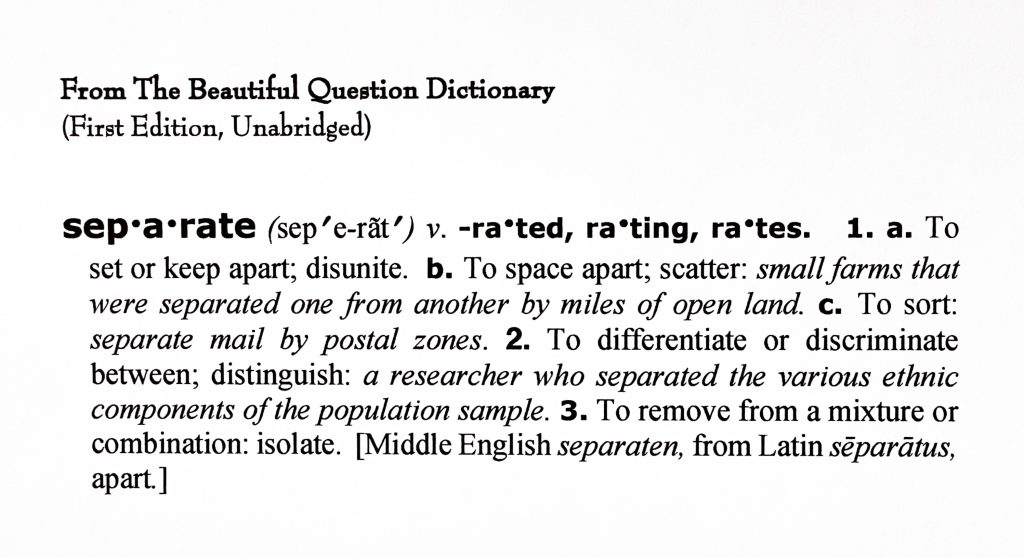Separating Fact from Feelings
[ theme music rises ]
(Lose the Net by Rasmus Faber Courtesy of Epidemic Music)
Isn’t it amazing how good questions lead us naturally to good answers, and how beautiful questions lead to even better answers! When we open ourselves to the things we don’t know, we open the doors to discovery and greater understanding.
I’m Scott Lennox and you’re listening to The Beautiful Question, a weekly consideration of things that matter every day.
[ brief pause ]
It’s one thing to say, “That was then. This is now.” It’s quite another to separate what happened in the past from the feelings we’ve held onto about it.
Join me this week as we consider ways of doing exactly that.
[ brief pause as theme music fades ]
As we begin today’s consideration, here’s an excerpt from one of my older journals about closing my heart and opening it again.
I didn’t mean to, but I did it again. I got my feelings hurt and snapped my heart shut like a turtle pulling into its shell to protect itself. I’m happy to say I recovered from it faster than last time, but it still challenges and aggravates me.
I’m slowly learning to separate the things I experience from my feelings about them. The events and the feelings are two entirely different things, and while I keep feeling the anger or frustration or sadness, most of what happened ended a long time ago. When I stop to think about it, I’m only punishing myself when I keep feeling the pain I originally felt. What’s the point in that?
from the author’s daily journal
While I know of no way to statistically quantify it, you can agree that much of what we feel has more to do with what happened in the past than what we’re experiencing now. That wouldn’t pose a problem if those recycled feelings didn’t keep us from fully enjoying what we’re doing in the present, but that’s exactly what happens.
Think about it. If we can be changed down to the level of our DNA by exposure to things like radiation or pollution or certain frequencies of sound, it stands to reason that traumatic events can also affect that deeply. Studies in neuroplasticity demonstrate that such change can also be generated by the things we repeatedly tell ourselves and the feelings those thoughts generate.
[ brief pause ]
When I stop to honestly consider how long I’ve carried some of the emotions I’ve tenaciously held onto, I can hear my ranching friend CW saying, “Well son, you got five pounds of stuff in a two-pound bag. That’s yer problem.” (I had to clean that up a bit. He’s a cowboy, after all.)
Having listened to thousands of people in my long career as a counselor, I’ve reached the conclusion that people often feel things about the past that don’t match what happened at all. Somewhere between the original event and now, they’ve changed or intensified their feelings about it, sometimes rewriting their original narrative about the event altogether.
[ brief pause ]

I recently heard a wise teacher clarify this issue. He offered the example of someone losing a parent or loved one years ago and still feeling sad about it years later. While it’s natural to feel grieve and feel sad, he asked how long we have to keep feeling the same intensity of sorrow about it.
From my own practice, I’ve heard countless people tell me that they were neglected or abused or betrayed early in life and that they continue to feel angry or rageful or embittered. That’s especially troublesome when the people who hurt them are no longer alive. When I hear it, I always ask the same two-part question.
“What is your anger (or rage or sadness or resentment or bitterness or frustration) producing now, and what effect is the endless replaying of those emotions having on you and the quality of your life?”
Most often, the answers I hear reflect on the past and have nothing to do with feeling better in the present. I’m told things like, “Well, he shouldn’t have treated me that way.” or “If I forgive her, she gets a free pass and I’m still stuck with being hurt.” or “It’s not that easy to let it go. What they did to me wasn’t right.” And then there’s the old standby, “Don’t even ask me to forgive and forget.”
I’ll agree that what happened was painful or hurtful, yet I challenge that nothing is healed or improved by continuing to feel the same emotions about an event that has long been over. In fact, the negative emotions we hang onto erode the quality our life in the present. And make no mistake about it, we’re the only ones who can do something healthy about that.
[ brief pause ]
One of the most important things we can do to liberate ourselves from the habit of corrupting the present with our recycled emotions is to bring ourselves back to right here and right now—this place and no other, this time and no other.
As someone who’s doing remarkable work with this has suggested, ask yourself, “What do I want to feel instead and how do I want to live my life right here and right now?”
That insight leads us to this week’s three Beautiful Questions, beginning with a slight embellishment of the one I just asked.
[ brief pause ]
Question One: Instead of what I’ve been feeling about my past, what do I want to feel and how do I want to live my life right here and right now?
Question Two: What have I been thinking or telling myself about my past that is keeping me toxically stuck?
Question Three: What can I tell myself that will help me step back into the extreme present—right here and right now?
[ brief pause ]
As you ponder these questions and bring yourself increasingly back into the present, I hope you offer yourself the clarity and peace and freedom you deserve.
As I say each week,
My Light with Your Light!
[ theme music & sign-off ]
I’m happy we can engage this way every week as we consider things that matter and what to do about them. If nothing else, I hope you feel inspired to look more deeply at ways of caring for yourself. You deserve that.
You can be further inspired by visiting my friends at Kosmos Journal. That’s K O S M O S Journal. Their mission is to inform, inspire, and engage global transformation in harmony with all life. You can easily find them online at Kosmos Journal dot O R G.
And each week at thebeautifulquestion.com, you can read the illustrated transcript of each podcast as you listen. We’ve also included an archive of all previous podcasts, including guided relaxation audios that can help you practice letting go on a daily basis.
If you find these podcasts useful, I encourage you to share them and tell others about them. That’s a great way of helping me get a voice of calm and collaboration and balance and encouragement out into the world.
[ brief pause ]
I’m Scott Lennox, and this has been The Beautiful Question.
[ brief pause ]
The Beautiful Question is a One Light production, written, produced, and engineered by Scott Lennox at HeartRock Studios in Fort Worth, Texas, as a way of paying forward to life, being fully present, becoming better engaged with things that truly matter in a complex world, and committing to a healthier future for all of us.
